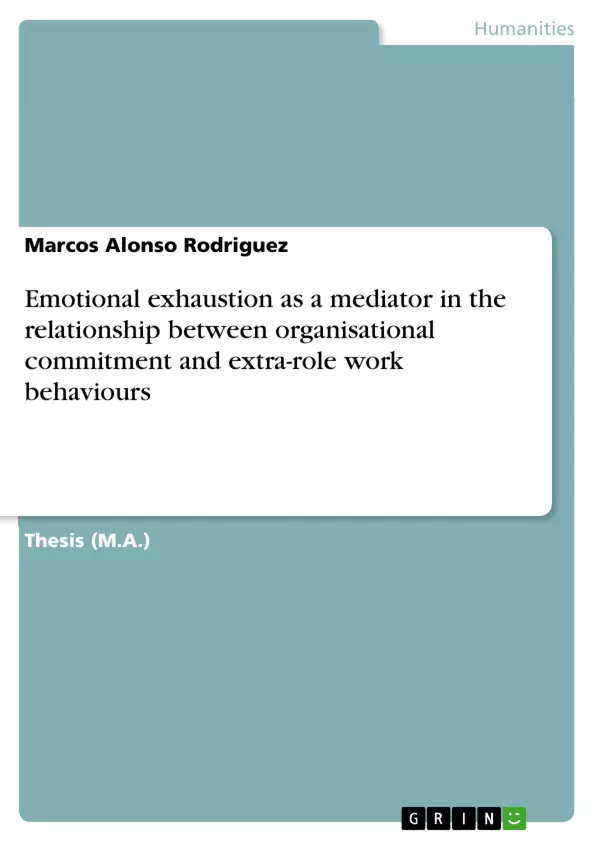This study examines the relationship between organizational commitment and citizenship behaviours, counterproductive work behaviours and turnover intentions. It also investigates the mediation effect of exhaustion on these relationships. Data were obtained from 87 workers of a health care Charity Trust based in the UK. Hierarchical regression analysis indicated that organizational commitment was related to counterproductive work behaviours and turnover intentions but not to citizenship behaviours. Moreover, exhaustion partially mediated the organizational commitment and turnover intentions relationship. However it is discussed that this mediation is not critical as the effects of exhaustion are overshadow by those of commitment.
Inhaltsverzeichnis (Table of Contents)
- INTRODUCTION
- LITERATURE REVIEW
- Organisational Commitment
- Emotional Exhaustion
- Behaviour at work
- HYPOTHESES
- Organizational Commitment and Exhaustion
- Organizational Commitment and OCB
- Organizational Commitment and CWB
- Organizational Commitment and Turnover Intentions
- Exhaustion and Turnover intentions
- Exhaustion and OCB and CWB
- Exhaustion as a mediator
- ORGANIZATIONAL CONTEXT
- METHOD
- Participants
- Measures
- Procedure
- Ethical Considerations
- ANALYTICAL TECHNIQUE
- RESULTS
- Descriptive statistics
- Correlational analysis (hypotheses 1-7)
- Mediation analyses
- DISCUSSION
Zielsetzung und Themenschwerpunkte (Objectives and Key Themes)
This study investigates the role of emotional exhaustion as a mediator in the relationship between organisational commitment and extra-role work behaviours. The author aims to explore the link between commitment, exhaustion, and employee behaviours that go beyond their formal job duties, including organisational citizenship behaviour (OCB), counterproductive work behaviour (CWB), and turnover intentions.
- Organisational Commitment: Examining the various facets of commitment, including affective, continuance, and normative commitment.
- Emotional Exhaustion: Exploring the impact of emotional exhaustion on employee behaviours and well-being.
- Extra-Role Work Behaviours: Investigating the relationship between organisational commitment, emotional exhaustion, and employee behaviours such as OCB, CWB, and turnover intentions.
- Mediation Effects: Assessing the mediating role of emotional exhaustion in the relationship between organisational commitment and extra-role work behaviours.
- Practical Implications: Identifying practical implications for organisations and managers in managing employee commitment and well-being, particularly in relation to emotional exhaustion.
Zusammenfassung der Kapitel (Chapter Summaries)
- Introduction: This chapter sets the stage for the study, outlining the importance of understanding the relationship between organisational commitment, emotional exhaustion, and extra-role work behaviours. The author provides a brief overview of the research question and hypotheses.
- Literature Review: This chapter reviews the existing literature on organisational commitment, emotional exhaustion, and extra-role work behaviours, providing a theoretical framework for the study. It examines the different types of commitment, the nature of emotional exhaustion, and the various types of extra-role behaviours.
- Hypotheses: This chapter presents a series of hypotheses that guide the research, outlining the expected relationships between organisational commitment, emotional exhaustion, and employee behaviours. The hypotheses are grounded in the theoretical framework established in the literature review.
- Organisational Context: This chapter provides detailed information about the organisational setting in which the study was conducted, offering context for interpreting the results.
- Method: This chapter outlines the methods used in the study, including the participants, measures, procedure, and ethical considerations. It provides a detailed description of the data collection and analysis procedures.
- Analytical Technique: This chapter delves into the statistical techniques employed to analyse the data, explaining the specific analyses used to test the hypotheses. The chapter provides a clear description of the methodological approach.
- Results: This chapter presents the findings of the study, reporting on the descriptive statistics, correlational analyses, and mediation analyses. The findings are presented in a clear and concise manner, providing empirical evidence for the relationships between the variables of interest.
Schlüsselwörter (Keywords)
The study focuses on the key concepts of organisational commitment, emotional exhaustion, extra-role work behaviours, and mediation. It explores the relationship between affective, continuance, and normative commitment, as well as the impact of emotional exhaustion on employee engagement, turnover intentions, and counterproductive work behaviour. The study utilises empirical data analysis to investigate the mediating role of emotional exhaustion in the relationship between organisational commitment and employee behaviours, providing insights into the dynamics of employee attitudes and actions within organisations.
Frequently Asked Questions
What is the main focus of this study?
The study investigates how emotional exhaustion acts as a mediator between organizational commitment and extra-role work behaviors like OCB and CWB.
What are OCB and CWB?
OCB stands for Organizational Citizenship Behavior (positive extra actions), while CWB stands for Counterproductive Work Behavior (actions harmful to the organization).
Does organizational commitment reduce turnover intentions?
Yes, the results indicate that higher organizational commitment is related to lower turnover intentions and fewer counterproductive behaviors.
How does emotional exhaustion affect the relationship between commitment and turnover?
Exhaustion partially mediates the relationship, meaning that low commitment leads to higher exhaustion, which in turn increases the desire to leave the job.
Which facets of commitment are examined?
The paper examines affective, continuance, and normative commitment as defined in organizational psychology.
- Quote paper
- Marcos Alonso Rodriguez (Author), 2006, Emotional exhaustion as a mediator in the relationship between organisational commitment and extra-role work behaviours, Munich, GRIN Verlag, https://www.grin.com/document/275875



